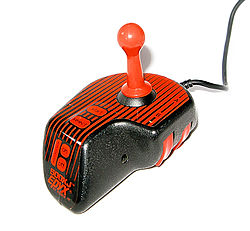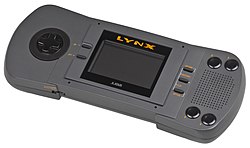Epyx: Difference between revisions
m →Bankruptcy and asset sales: Tighten |
Rescuing 1 sources and tagging 0 as dead. #IABot (v1.2.7.1) |
||
| Line 1,073: | Line 1,073: | ||
*[http://www.mobygames.com/company/epyx-inc Epyx profile] on [[MobyGames]] |
*[http://www.mobygames.com/company/epyx-inc Epyx profile] on [[MobyGames]] |
||
*[http://thedoteaters.com/?bitstory=epyx "Epyx Journey"] – An in-depth history of Epyx |
*[http://thedoteaters.com/?bitstory=epyx "Epyx Journey"] – An in-depth history of Epyx |
||
*[http://gotcha.classicgaming.gamespy.com/epyx.htm Epyx history and game list] – GOTCHA on GameSpy. |
*[https://web.archive.org/web/20081227080131/http://gotcha.classicgaming.gamespy.com/epyx.htm Epyx history and game list] – GOTCHA on GameSpy. |
||
*[http://www.c64sets.com/epyx_brochures.html Images of some early Epyx brochures] |
*[http://www.c64sets.com/epyx_brochures.html Images of some early Epyx brochures] |
||
*[http://www.atariguide.com/10/1009.php Epyx 500XJ Joystick Brochure] |
*[http://www.atariguide.com/10/1009.php Epyx 500XJ Joystick Brochure] |
||
Revision as of 05:26, 25 December 2016
This article includes a list of general references, but it lacks sufficient corresponding inline citations. (August 2012) |
 | |
| Company type | Corporation |
|---|---|
| Industry | Computer and video games |
| Founded | 1978 (as Automated Simulations) |
| Defunct | 1993 |
| Headquarters | San Francisco, California |
Key people | Jim Connelley Jon Freeman David Shannon Morse (software manager) |
| Products | Temple of Apshai Jumpman Summer Games (series) Impossible Mission |
Epyx, Inc. was a video game developer and publisher active in the late 1970s and 1980s. The company was founded as Automated Simulations by Jim Connelley and Jon Freeman, originally using Epyx as a brand name for action-oriented games before renaming the company to match in 1983. Epyx published a long series of games through the 1980s, but nevertheless went bankrupt in 1989 before finally disappearing in 1993.
History
Formation
In 1977, Susan Lee-Murrow invited Jon Freeman to join a Dungeons & Dragons game hosted by Jim Connelley and Jeff Johnson. Connelley later purchased a Commodore PET computer to help with the bookkeeping involved in being a dungeon master, and came up with the idea of writing a computer game for the machine before the end of the year so he could write it off on his taxes. Freeman had written on gaming for several publications, and joined Connelley in the design of a new space-themed wargame. Starting work around August 1978, Freeman wrote the basic rules, mission sets, background stories and the manual, while Connelley coded up the system in PET BASIC.[1]
The BASIC era
The two formed Automated Simulations around Thanksgiving 1978 to market the game, and released it in December as Starfleet Orion.[1] Examining contemporary magazines (Byte and Creative Computing) suggests this is the first commercial space-themed wargame for a personal computer.[a] As the game was written in BASIC, it was easy to port to other home computers of the era, starting with the TRS-80 and then the Apple II, the latter featuring rudimentary graphics. They followed this game with 1979's Invasion Orion, which included a computer opponent so as not to require two human players.[1]
The company's next release, 1979's Temple of Apshai, was a major success, selling over 20,000 copies in an era of few computers.[2] As the game was not a "simulation" of anything, the company introduced the Epyx brand name for these more action-oriented titles. Rated as the best computer game by practically every magazine of the era, Apshai was soon ported from the TRS-80 to additional systems, such as the Atari 400/800 and the Commodore 64. Apshai spawned a number of similar adventure games based on the same game engine, including two direct sequels, branded under the Dunjonquest label. The games were so successful that they were later re-released in 1985 as the Temple of Apshai Trilogy.
Using the same BASIC game engine, a series of "semi-action" games followed under the Epyx brand, including Crush, Crumble and Chomp!, Rescue at Rigel, and Star Warrior, each of which added twists to the Apshai engine.[1]
Growth, action focus
Freeman became increasingly frustrated by Connelley's refusal to update the game engine. He left the company to start Free Fall Associates in 1981, leaving Connelley to lead what was now a large company. In 1983 the company assumed its brand name, becoming known simply as Epyx. Connelley reorganized his own development team as The Connelley Group, but continued to work under the Epyx umbrella, releasing Dragonriders of Pern. However 1983 was the year that Jumpman was released and became a big hit. Management decided the future was in action games, and Connelley eventually left the company, releasing games with other labels such as Brøderbund.
By early 1984 InfoWorld estimated that Epyx was the world's 16th-largest microcomputer-software company, with $10 million in 1983 sales.[3] A string of successful action games followed, including the hits Impossible Mission and Summer Games. The latter created a long run of successful sequels, including Summer Games II, Winter Games, California Games, and World Games. The company also branched out into "Computer Activity Toys", licenses of Hot Wheels, G.I. Joe, and Barbie. In Europe, the British home computer game company U.S. Gold published Epyx games for the Commodore 64, and also ported many of the games to other major European platforms such as the ZX Spectrum and Amstrad CPC.

For the bestselling Commodore 64, Epyx made the Fast Load cartridge which enabled a fivefold speedup of floppy disk drive accesses through Commodore's very slow IEEE-488 interface. Additionally, the FastLoad featured convenient disk access commands (for directory listings and program loads/saves, etc.), and a disk editor—a hacking tool allowing for direct low-level access to floppy disks. Another hardware product was the popular Epyx 500XJ Joystick, which used high-quality microswitches and a more ergonomic form factor than the Atari 2600 joystick style then prevalent.
Starting in 1986, Epyx also developed a handheld game system called the Handy. Unable to continue due to high costs, it was sold to Atari, renamed, and sold as the Atari Lynx.[4][5]
Litigation
In 1987, Epyx faced an important copyright infringement lawsuit from Data East USA regarding Epyx's Commodore 64 video game World Karate Championship. Data East thought the whole game, and particularly the depiction of the referee, looked too much like its 1984 arcade game Karate Champ. Data East won at the US District Court level and Judge William Ingram ordered Epyx to recall all copies of World Karate Championship. Epyx appealed the case to the United States Court of Appeals for the Ninth Circuit, who reversed the judgment and ruled in favor of Epyx, stating that copyright protection did not extend to the idea of a tournament karate game, but specific artistic choices not dictated by that idea.[6] The Court noted that a "17.5 year-old boy" could see clear differences between the elements of each game actually subject to copyright.[6]
Bankruptcy and asset sales
More than half of Epyx's sales usually came from the Commodore 64 market. In 1988 its two newest Games titles did not sell as well as the older California Games, and the 64 game market collapsed by Christmas because of competition from the Nintendo Entertainment System. Others began developing Nintendo titles, but Epyx refused, preferring to continue developing its handheld console.[5]
Epyx was unable to fulfill its contract with Atari to finish developing Lynx hardware and software, and the latter withheld payments that the former needed.[5] By the end of 1989 Epyx discontinued developing computer games, began making only console games,[7] and filed for Chapter 11 bankruptcy protection.[8] According to Stephen Landrum, a long-time game programmer at Epyx, the company went bankrupt "because it never really understood why it had been successful in the past, and then decided to branch out in a lot of directions, all of which turned out to be failures."[9]
Epyx had shrunk from 145 employees in 1988 to fewer than 20 by the end of 1989. After emerging from bankruptcy the company resumed game development but only for the Lynx, with Atari acting as publisher.[5] In 1993, with eight employees left, they decided just to sell off the rest of the company. Bridgestone Media Group eventually acquired the rights the rest of Epyx's assets. Job offers were extended to the eight remaining employees, but only Peter Engelbrite accepted.
In 2006, British publisher System 3 announced it had acquired Epyx's assets to release games such as California Games and Impossible Mission for Nintendo DS, PlayStation Portable, and Wii in 2007.[10]
Products
Games
Other software
| Name | Year | Platforms | Description |
|---|---|---|---|
| Epyx Fast Load | 1984 | Commodore 64 | A powerful disk drive loading accelerator, one of the most widely used peripherals for the Commodore 64, it also contained a number of other useful software tools |
| Print Magic | 1988 | Apple II | A home desktop publishing suite, it outperformed the contemporary market leader at the time, The Print Shop, on all levels, though not a great commercial success[citation needed] |
| DOS |
Hardware
| Name | Year | Description | Image |
|---|---|---|---|
| 500XJ joystick | An Atari compatible joystick that was innovative in that its base was molded to more naturally fit a player's hand, so it was easier to use than traditional rectangular-based joysticks | 
| |
| Handy | 1989 | A handheld game console that was innovative in many ways. Short on capital at the time, however, Epyx licensed it to Atari, who christened it the Atari Lynx | 
|
Notes
References
- ^ a b c d Rusel DeMaria and Johnny Wilson, "High Score! The Illustrated History of Video Games", McGraw-Hill, 2003, pg. 54-55
- ^ Paul Freiberger, "This Company Is Serious about Games", InfoWorld, 11 May 1981, pg. 10-11
- ^ Caruso, Denise (1984-04-02). "Company Strategies Boomerang". InfoWorld. pp. 80–83. Retrieved 10 February 2015.
- ^ Peter Latimer, "Atari Lynx", Retro Gamer, Volume 2 Issue 6 (July 2005), pg. 24–31
- ^ a b c d Maher, Jimmy (2016-12-22). "A Time of Endings, Part 2: Epyx". The Digital Antiquarian.
- ^ a b Data East USA, Inc. v. Epyx, Inc., 862 F. 2d 204, 9 U.S.P.Q.2d (BNA) 1322 (9th Cir. 1988).
- ^ Ferrell, Keith (December 1989). "Epyx Goes Diskless". Compute!. p. 6. Retrieved 11 November 2013.
- ^ Wilson, Johnny L. (November 1991). "A History of Computer Games". Computer Gaming World. p. 10. Retrieved 18 November 2013.
- ^ Weihmann, Tobias. "Interview with Stephen H. Landrum". The Unofficial Epyx & SummerGames Homepage. Archived from the original on 2009-05-04. Retrieved 2015-10-11.
- ^ Brendan Sinclair, "Epyx returns on Wii, PSP, DS", gamespot, 17 August 2006
External links
- Epyx profile on MobyGames
- "Epyx Journey" – An in-depth history of Epyx
- Epyx history and game list – GOTCHA on GameSpy.
- Images of some early Epyx brochures
- Epyx 500XJ Joystick Brochure
- Epyx 500XJ Joystick Commercial (1986)
